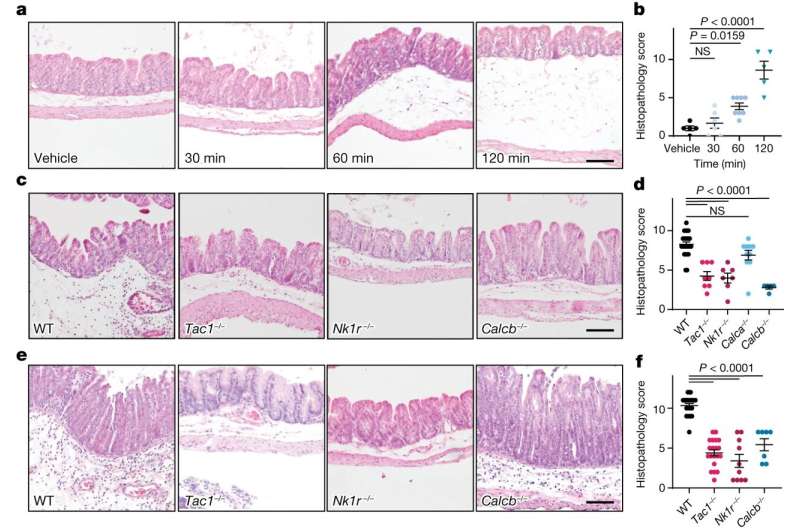This article has been reviewed according to Science X's editorial process and policies. Editors have highlighted the following attributes while ensuring the content's credibility:
fact-checked
peer-reviewed publication
trusted source
proofread
New study in mice suggests curbing intestinal inflammation can combat C. diff infection

Clostridioides difficile (C. diff) intestinal infections can cause severe, debilitating diarrhea in patients who are hospitalized or on immunosuppressive therapies. The infections can be very hard to eradicate, roaring back when patients try to taper their antibiotics. Many people wind up on antibiotics for months and can become resistant to three or more of them.
"Often being on antibiotics isn't sufficient," explained Meenakshi Rao, Harvard Medical School assistant professor of pediatrics at Boston Children's Hospital. "The infection can catalyze severe, runaway inflammation, especially in patients with inflammatory bowel disease."
This inflammation, in turn, promotes C. diff colonization of intestinal tissue. And antibiotics themselves could be part of the problem.
"Once we attack C. diff with antibiotics, it disrupts the gut microbiome," said Min Dong, HMS associate professor of surgery at Boston Children's, whose lab studies bacterial toxins and how to combat them. "That creates an opportunity for severe, recurring infection, and it becomes a vicious cycle."
A potential new approach—which Dong, Rao, and colleagues described in the journal Nature—focuses on curbing intestinal inflammation rather than fighting the bacteria directly.
Instead of antibiotics, the approach could employ drugs that are already in use for nausea and migraine.
The drugs worked in mice with a hypervirulent strain of C. diff. Rao hopes to develop a clinical trial to test these agents in people with C. diff infections.
Single-cell sleuthing
Dong was long aware that C. diff produces an extremely potent toxin—toxin B—but didn't know how it causes colonic inflammation.
Using single-cell RNA sequencing data and other techniques, his lab worked out the mechanism, showing that toxin B binds to specific receptors (FZD1/2/7 and CSPG4).
They further showed that two key cell types in gut tissues—sensory neurons and pericytes, respectively—sport these receptors at especially high levels.
"A few years ago, we wouldn't have been able to find this out," said Dong. "Now we can do so with single-cell technologies."
Rao's expertise in the complex neurobiology of the GI tract was critical.
She and Dong found that in response to the toxin, the sensory neurons secrete neuropeptides called substance P and calcitonin gene-related peptide (CGRP), while the pericytes, which surround blood vessels, produce pro-inflammatory cytokines.
In a mouse model, this drove intense neurogenic inflammation and tissue damage—the same kind of damage that occurs in human patients.
"It's a very strong acute inflammatory response that causes vessel dilation and a massive release of immune cells, cytokines, and inflammatory mediators that go into tissues," said Dong. "Normally this is a protective response, but it's overexaggerated, disrupting not just the bacteria but also host cells."
Repurposing drugs for nausea and migraine
FDA-approved drugs already exist to block the triggering neuropeptides.
Aprepitant, used for nausea and vomiting, blocks substance P signaling.
Small molecules related to olcegepant or monoclonal antibodies such as fremanezumab, used for migraines, inhibit CGRP signaling.
In the mouse model, these drugs reduced inflammation and tissue damage. Somewhat surprisingly, they even reduced the burden of C. diff bacteria in the animals' intestines.
"Recent work from others suggests that damage to intestinal cells can induce the release of nutrients that benefit C. diff," said Dong. "The immune response disrupts the microbiome, which promotes C. diff growth. Once we tune down this host response, C. diff is less able to survive."
Rao, who is also an affiliate faculty member of the F.M. Kirby Neurobiology Center at Boston Children's, hopes to collaborate with her gastroenterology colleagues to develop a clinical trial of one or more of the drugs. They would likely start in patients with antibiotic-resistant C. diff.
"We could start by using these drugs in conjunction with antibiotics, as an adjunctive therapy," she suggested. "We know these medications are safe."
More information: John Manion et al, C. difficile intoxicates neurons and pericytes to drive neurogenic inflammation, Nature (2023). DOI: 10.1038/s41586-023-06607-2


















